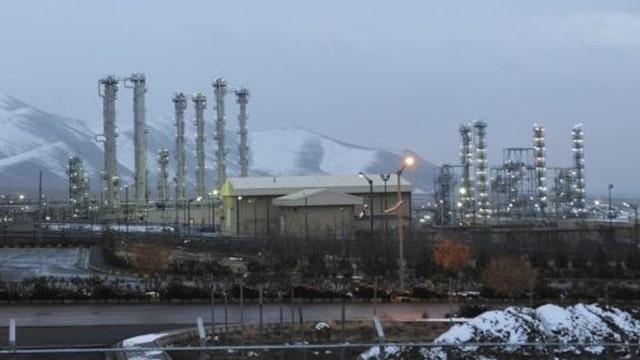Iran gives samples from sensitive nuclear site
Iranian nuclear experts took the samples without UN oversight
The Iranian government is pressing the U.S. and others to give even more ground to Tehran in the already-sealed nuclear agreement, posing a new headache as the Obama administration and others try to implement the deal.
Ayatollah Ali Khamenei earlier this month demanded that sanctions be lifted entirely, not just suspended. A top Khamenei adviser reiterated that demand over the weekend -- ahead of potential informal talks on the sidelines of the United Nations General Assembly.
Secretary of State John Kerry plans meet in the coming days in New York with his Iranian counterpart, Foreign Minister Mohammad Javad Zarif. According to Iran's Fars News Agency, Iranian officials also plan to meet with all members of the P5+1 group, which negotiated the deal, in New York on Sept. 28.
These reported plans prompted one group, the Middle East Media Research Institute (MEMRI), to question whether talks were being "reopened," in order to address Khamenei's concerns.
Asked about the speculation, a State Department official said there is no further negotiation and the U.S. expects the deal to be implemented "in good faith."
"We've long said that we're not going to comment on or react to every statement attributed to the Iranian leadership," the official told FoxNews.com. "Our focus is on implementing the deal, and verifying that Iran completes its key nuclear steps under the Joint Comprehensive Plan of Action. There is no renegotiation, and the nuclear-related sanctions relief that Iran will receive once the IAEA verifies that it has completed its nuclear steps is clearly spelled out in the text of the [agreement]."
But at the least, the ayatollah's demands show the post-deal debate shifting now from Washington back to Tehran, leaving some uncertainty in the air as the U.S. and U.N. prepare to move forward.
In Washington, congressional critics have been unable to muster the votes to even send President Obama a resolution disapproving the deal. But in Tehran, the ayatollah on Sept. 3 renewed concerns about the nature of the deal's sanctions relief.
He said in a statement that sanctions should be lifted entirely, not just suspended -- and said "there will be no deal" unless this is done.
According to MEMRI's translation, he warned that if sanctions are only suspended, Iran, in turn, will only "suspend" nuclear activities cited in the deal. He also called for a parliamentary vote on the deal, though it's unclear whether that will happen.
Iran's Fars News Agency over the weekend quoted ayatollah adviser Ali Akbar Velayati saying Khamenei's views "should be materialized." He added: "It is understood from the Supreme Leader's remarks that balance is necessary in the two sides' measures and in case of imbalance, nothing will be done."
The text of the Iran nuclear agreement actually refers to the "lifting" of sanctions. But the White House has said that sanctions "will snap back into place" if Iran violates its end, indicating they indeed see the sanctions relief as reversible.
MEMRI wrote that the upcoming meeting could be a forum for all parties to "discuss the Iranian demand for further concessions." MEMRI, though, warned that outright lifting sanctions "would constitute a fundamental change" to the deal. "This is because lifting the sanctions, rather than suspending them, will render impossible a snapback [of sanctions] in case of Iranian violations."
The nature of the discussions being held next week is unclear.
On Sept. 20, Kerry said he planned to meet with his Russian and his Iranian counterpart, "regarding Iran and other things." But he indicated the meeting would cover a range of topics, including the Syrian civil war.
While Fars reported that the Iranians will meet with P5+1 representatives in New York on Sept. 28, the State Department has not announced such a meeting.
Earlier this month, after Iran's Supreme Leader spoke out against the process for sanctions relief in the deal, White House Press Secretary Josh Earnest put the onus on Iran to follow through with its end before sanctions relief is even implemented.
"We've been crystal-clear about the fact that Iran will have to take a variety of serious steps to significantly roll back their nuclear program before any sanctions relief is offered," he said. "... And only after those steps and several others have been effectively completed, will Iran begin to receive sanctions relief. The good news is all of this is codified in the agreement that was reached between Iran and the rest of the international community."
FoxNews.com's Judson Berger contributed to this report.





